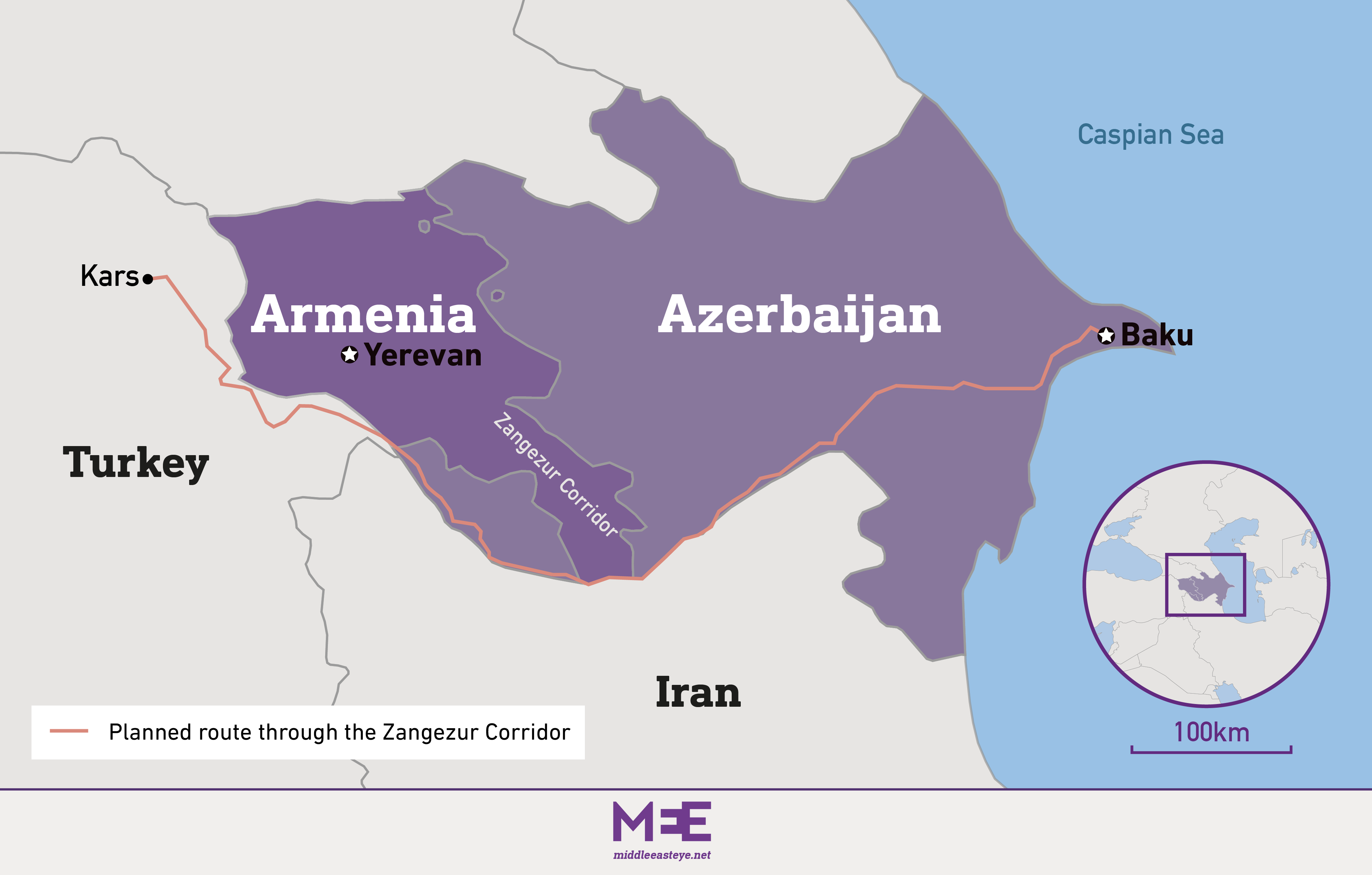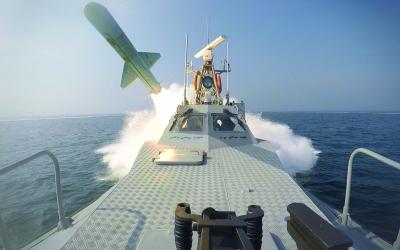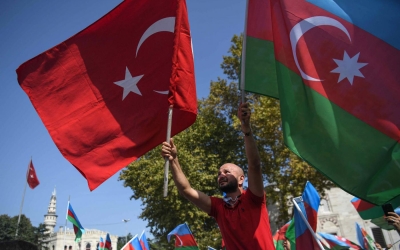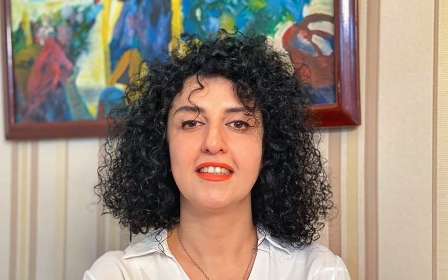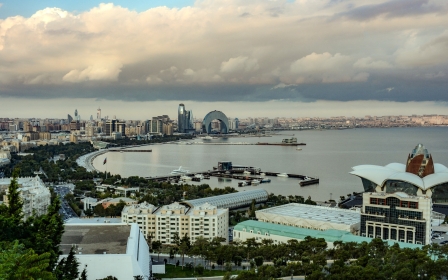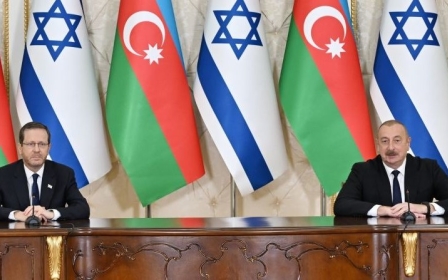Iran: What are the implications of Azerbaijan's victory over Armenia?
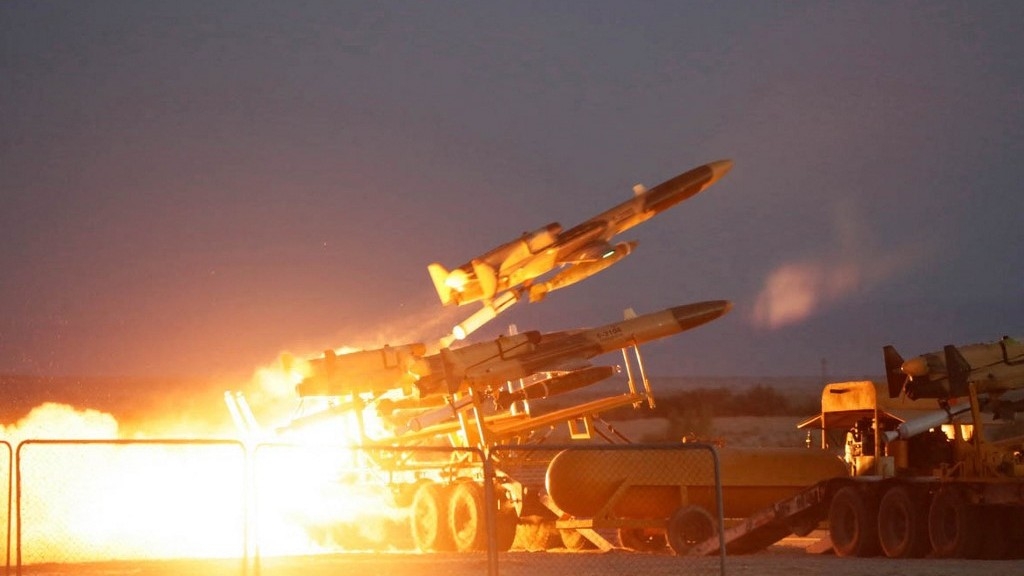
Azerbaijan's swift victory in its September conflict with Armenia effectively brought a protracted conflict, dating back to 1988, to an end.
Azerbaijan seized control of the breakaway Nagorno-Karabakh territory where reports say more than 120,000 Armenians living in the enclave have now fled to Armenia. The president of the self-declared Republic of Artsakh dissolved all institutions of the disputed region.
The decisive victory, however, has also put Iran on notice about the changing dynamics in the region.
To understand the current state of relations between Armenia, Iran and Azerbaijan, one must first appreciate their complex connections.
On paper, the Islamic Republic of Iran and Armenia, one of the oldest Christian communities in the world, make for unusual close allies.
New MEE newsletter: Jerusalem Dispatch
Sign up to get the latest insights and analysis on Israel-Palestine, alongside Turkey Unpacked and other MEE newsletters
But over the past three decades, both countries, which share a border, have developed close political ties. Iran has even extended electricity to Armenia during periods of energy shortages, strengthening their bilateral links.
Conversely, Iran's relationship with Azerbaijan, which shares ethnic, linguistic and religious ties, has been riven with tensions.
Earlier this year, Middle East Eye reported on a growing chorus of voices in Iran calling for more aggressive policies against Azerbaijan.
Iran, at least publicly, has supported Azerbaijan's territorial integrity legally, and politically it couldn't stand against it.
According to Hamidreza Azizi, an expert on geopolitics and security in the Middle East at the German Institute for International and Security Affairs, Iranian policymakers are mainly preoccupied with the broader implications of Azerbaijan taking the upper hand in the region and the wider geopolitical and geo-economic ramifications of that.
Turkey, Israel reshaping the South Caucusus
The collapse of the Soviet Union in 1991 marked a significant turning point in the region.
Armenia and Azerbaijan emerged as newly independent states, while Iran reasserted itself as a key player in the changing political landscape alongside Russia.
Now Turkey and Israel, which have been Azerbaijan's main military and political backers, are driving changes in the regional order.
"Geo-economically speaking, Iran's main concern is the potential establishment of the Zangezur corridor," Azizi told MEE.
The Zangezur corridor is a strategically significant narrow strip of land in Armenia's Syunik province, which separates the main part of Azerbaijan from the Nakhchivan, an autonomous exclave of Azerbaijan.
This corridor, approximately 3.5km wide at its narrowest point, would serve as the only land connection between mainland Azerbaijan and Nakhchivan, which is also connected to Turkey.
Both Turkey and Azerbaijan have called for the corridor to be opened, which could have important implications for Iran.
For one, said Azizi, it would "significantly decrease the importance of Iran in any future Chinese plan for the region within the framework of the Belt and Road Initiative".
The move to create the Zangezur corridor would also have geopolitical implications.
"It has been indicated by Azeri officials from time to time that setting up the Zangezur corridor would somehow involve Iran losing its land access to Armenia," Azizi said.
Various arrangements have been floated including an internationally controlled corridor, which, if it went through Syunik province, "would be a geopolitical catastrophe" for Iran, he said.
At the end of the 44-day Karabakh War in 2020, Armenia and Azerbaijan signed a ceasefire agreement brokered by Russia, which stated that "all economic and transport connections in the region shall be unblocked".
It also stated that Armenia would guarantee the security of transport connections between Azerbaijan and Nakhchivan.
For Azerbaijan, that implied the creation of the Zangezur corridor. In Tehran, that implies the limiting of its geopolitical options and increased dependence on Azerbaijan, which has close ties to Israel, Iran's arch-enemy and Ankara's regional competitor.
Iran's fear is not about Karabakh per se, said Azizi, but what it implies about Azerbaijan's phased approach in meeting all its objectives.
"Baku retaking Nagorno Karabakh is a prelude to the establishment of the Zangezur corridor. That's what alarms Iran," he said.
Despite strong opposition, Iran's ability to respond is so far limited. Russia has indicated that it is willing to accept some sort of accommodation, its hand weakened following the war in Ukraine.
Though Iran might not want to admit it, Tehran no longer enjoys the backing of Russia, its main partner in the region. Azizi said. "Not only is Russia not supporting Armenia, but it actually sides with Turkey."
A matter of national sovereignty for Iran
Within Iran, maintaining an open border with Armenia has become a "matter of patriotism and nationalism", said Armin Montazeri, foreign policy editor at Ham-Mihan, an Iranian newspaper.
"Public opinion towards this matter is that Iranians even support their government's military approach against any actions on the border with Armenia, if it is a necessity."
In Iran, memories of losing control over various Caucasus territories in the early 19th century following wars with Russia, including modern-day Azerbaijan, Georgia, Dagestan, Armenia, and Igdir in Turkey, continue to rankle in nationalist quarters.
'Iran now is faced with two countries with clear borders, and it has to choose whether it wants to go on through cooperation with the two or animosity with one'
- Armin Montazeri, foreign policy editor at Ham-Mihan
Similar ideas also permeate Turkish society, where a land corridor with Azerbaijan is seen as a gateway into Central Asia and a means to reconnect with other Turkic states.
Beyond historical grievances, policymakers in Iran now have to tread a finer line than before, said Montazeri.
"Iran now is faced with two countries with clear borders, and it has to choose whether it wants to go on through cooperation with the two or animosity with one. And I think this shift will also have an impact on Iran public opinion," added Montazeri.
Turkish President Recep Tayyip Erdogan has tried to allay Iranian fears by suggesting that Tehran would be included in plans to create common prosperity amongst the countries.
"When Erdogan said that Iran has no problem with the Zangezur corridor, Iranian officials did not deny that," said Montazeri, adding that it means that Tehran is "willing to talk about the idea".
Lingering suspicions
Such assurances from Turkey, however, will have to contend with lingering suspicions within Iran, said Ali Vaez, director of the Iran Project at the International Crisis Group.
Azerbaijan, having achieved significant territorial gains, is likely to focus on consolidating its control over the newly acquired territories while maintaining its strategic energy interests with Iran.
Armenia, on the other hand, faces the daunting task of rebuilding its economy, incorporating an influx of refugees, and coming to terms with the new geopolitical realities in the South Caucasus.
Meanwhile, Iran has to contend with two long-standing concerns with regards to Azerbaijan that have been compounded in the aftermath of the 2020 conflict, Vaez said.
"The first is related to Iran's own apprehensions about its territorial integrity. Nearly a third of Iran's nearly 88 million citizens are ethnic Azeris, who speak a Turkic mother tongue and mainly reside in the country's northwestern provinces bordering Azerbaijan, Armenia and Turkey," Vaez told MEE.
"Tehran has historically feared irredentist sentiment among its Azeri population, and remains acutely sensitive to what it perceives as pan-Turkic rhetoric across Azerbaijan, as well as the broader South Caucasus and Central Asia."
In a sign of support towards Armenia, Iranian national security chief Ali Shamkhani met with his counterpart, Armen Grigoryan, earlier this month.
"Tension and conflict in the Caucasus region are not in the interest of any country," said Shamkhani.
In a press conference on Monday, Iran's foreign ministry spokesperson, Nasser Kanani, while expressing support for Azerbaijan's reclamation of the separatist Karabakh region, warned that it strongly remains "against making geopolitical changes in the region and this is our clear position".
In the past Iran has even conducted military drills on the border with Azerbaijan, and opened a consulate in Kapan, the capital of Syunik province, "as a means of expressing its opposition to any change of borders in that region," said Vaez.
For Azizi, a direct conflict between Armenia and Azerbaijan could see Iran potentially providing drones.
“There could be quite a few wild-card scenarios and unpredictable circumstances," in such a situation where Russia and Turkey retain important roles in the region, said Azizi.
Only if the threat from Israel towards Iran were to become "immediate" could it potentially push Iran to take extreme measures, but short of that "it's really complicated, and Tehran's options are much more limited compared to the past," concluded Azizi.
Middle East Eye delivers independent and unrivalled coverage and analysis of the Middle East, North Africa and beyond. To learn more about republishing this content and the associated fees, please fill out this form. More about MEE can be found here.


